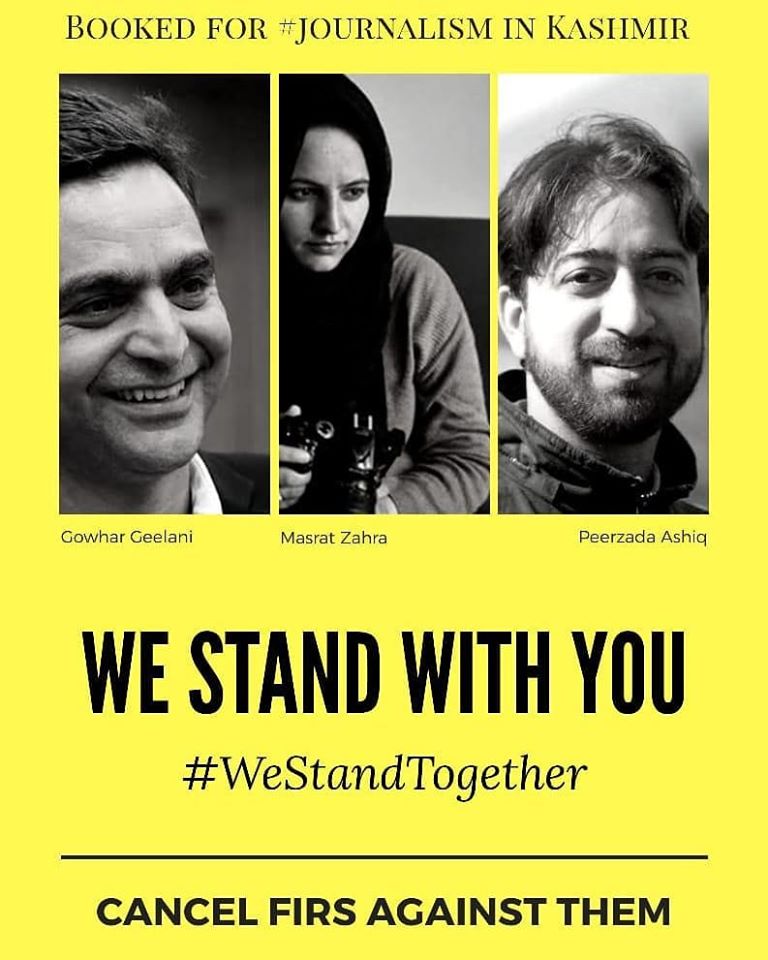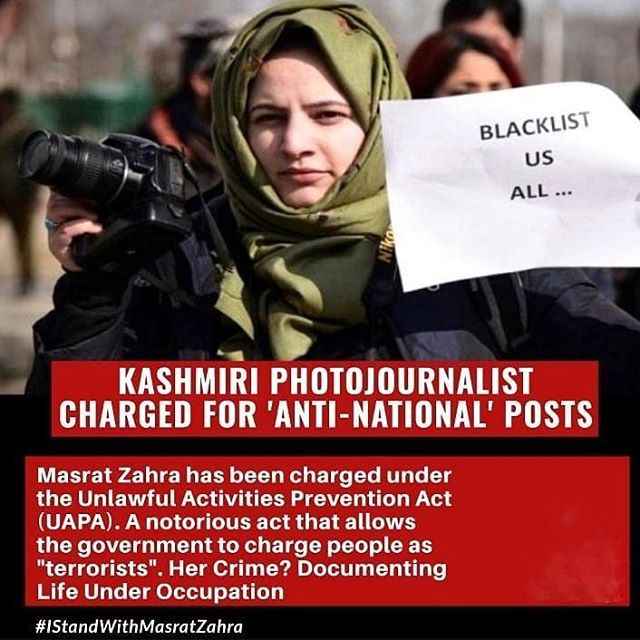‘State wants to control media’: Journalists in Kashmir brace for worse

By Auqib Javeed, TwoCircles.net
Srinagar: The Union Territory administration seems to have started a “war” against the Journalists working in the valley as coronavirus pandemic continues to upend lives across India and the world.
At least 3 Journalist have been booked in the past three days under various sections that many deemed “draconian”.
On Tuesday, Journalist and author Gowhar Geelani became the latest victim of the FIR spree in the erstwhile state. The cyber wing of J&K Police booked Geelani for social media posts deemed “prejudicial to national integrity”.
The case against Geelani comes a day after a female photojournalist Masrat Zahra and Peerzada Ashiq, a correspondent of a national daily were booked under various sections of the IPC and the stringent Unlawful Activities Prevention Act (UAPA).
The latest World Press Freedom Index has ranked India 142, two points below its 2019 rank, indicating immense curbs on freedom of speech and expression across the country.
Zahra, who was booked earlier this week for her social media posts termed the recent cases against journalists as “intimidation” tactics.
“It is very unfortunate that they (Police) invoked terrorism law on a Journalist,” Zahra, 26 told TwoCircles.net.
“I have been uploading my work on social media from the last 4 years. I am not a Facebook user that I was called, but a professional photojournalist,” she added.
On Monday, the J&K Police invoked draconian UAPA law to book Zahra for allegedly uploading anti-national posts photographs on social media.
Zahra has been booked under Section 13 of the UAPA, which prescribes punishment of seven years’ jail if found guilty, and IPC Section 505, which deals with provocation to commit an offence against a class or community.
Calling her a “Facebook user”, the police complaint charges her for “uploading anti-national posts with criminal intention to induce the youth and to promote offences against public tranquility.”
It also adds “the user is also uploading posts that tantamount to glorify the anti-national activities and dent the image of law-enforcing agencies besides causing disaffection against the country

Masrat says the FIR is an attempt to muzzle the voices of all the journalists working in Kashmir.
“I don’t have any ideology neither I am affiliated with any political party. They did it just to silence me,” she said.
On Tuesday afternoon, Masrat appeared before the police officers and was let go after a round of questioning.
“I didn’t disown my work and I gave clear answers to the investigating officers.”
Similarly, Ashiq was summoned by the police to explain the alleged factual inaccuracies in one of his stories. He was subsequently booked under an FIR (No. 81/2020) in relation to the news item at the Anantnag police station.
The summoning and subsequent of FIR’s against the scribes have led to massive outrage among various quarters, including journalists, who are demanding the withdrawal of complaints.
Shams Irfan, who works with The Washington Post from Kashmir said that Kashmiri Journalists literally put their lives at risk to get the truth out.
“Booking young Journalist on under harsh law is just one example of what we face while doing so,” he said.
Mushtaq Ahmed, who works with newspaper Kashmir Observer, termed the latest attacks on press despicable and humiliating.
“State wants to control the media. The narrative that is going out from the Kashmir is irking the establishment,” Ahmed told TwoCircles.net. Last week, he was detained for two days in North Kashmir’s Bandipora district while performing his professional duties.
Several media organizations, including Committee to Protect Journalists (CPJ), Reporters Without Borders (RSF), besides political parties and trade bodies have condemned the cases against the journalists.
The Amnesty International on Tuesday condemned the Jammu and Kashmir Police for invoking the Unlawful Activities (Prevention) Act against the Journalists.
Avinash Kumar, Executive Director of Amnesty International India, said in a statement: “Harassment and intimidation of journalists through draconian laws such as UAPA threatens the efforts to address the COVID-19 pandemic and creates an atmosphere of fear and reprisal.”
CPJ demanded an immediate end to the harassment of Journalists and asked Indian government to ensure press freedom in Kashmir.
“Masrat Zahra and Peerzada Ashiq should be free to report on events in Jammu and Kashmir without facing harassment and intimidation from local authorities,” Aliya Iftikhar, CPJ’s senior Asia researcher said in a statement.
“Police should drop their investigations into both journalists, and India should reform its laws to make such capricious actions by police impossible.”
This is not the first time that the Journalists in the conflict-torn Kashmir have been arrested. Both state and non-state actors have been accused of silencing and hampering the work of journalists over the last three decades.
According to data released by the International Federation of Journalists (IFJ) in December, at least 21 journalists have been killed since 1990, often in targeted killings or because of being caught in the cross-fire, while attempting to cover the conflict in Kashmir.
Scores have been detained, beaten, kidnapped, intimidated, and harassed for their work. The situation has become worse after August 5 when the Indian government scrapped the special status of the erstwhile state.
